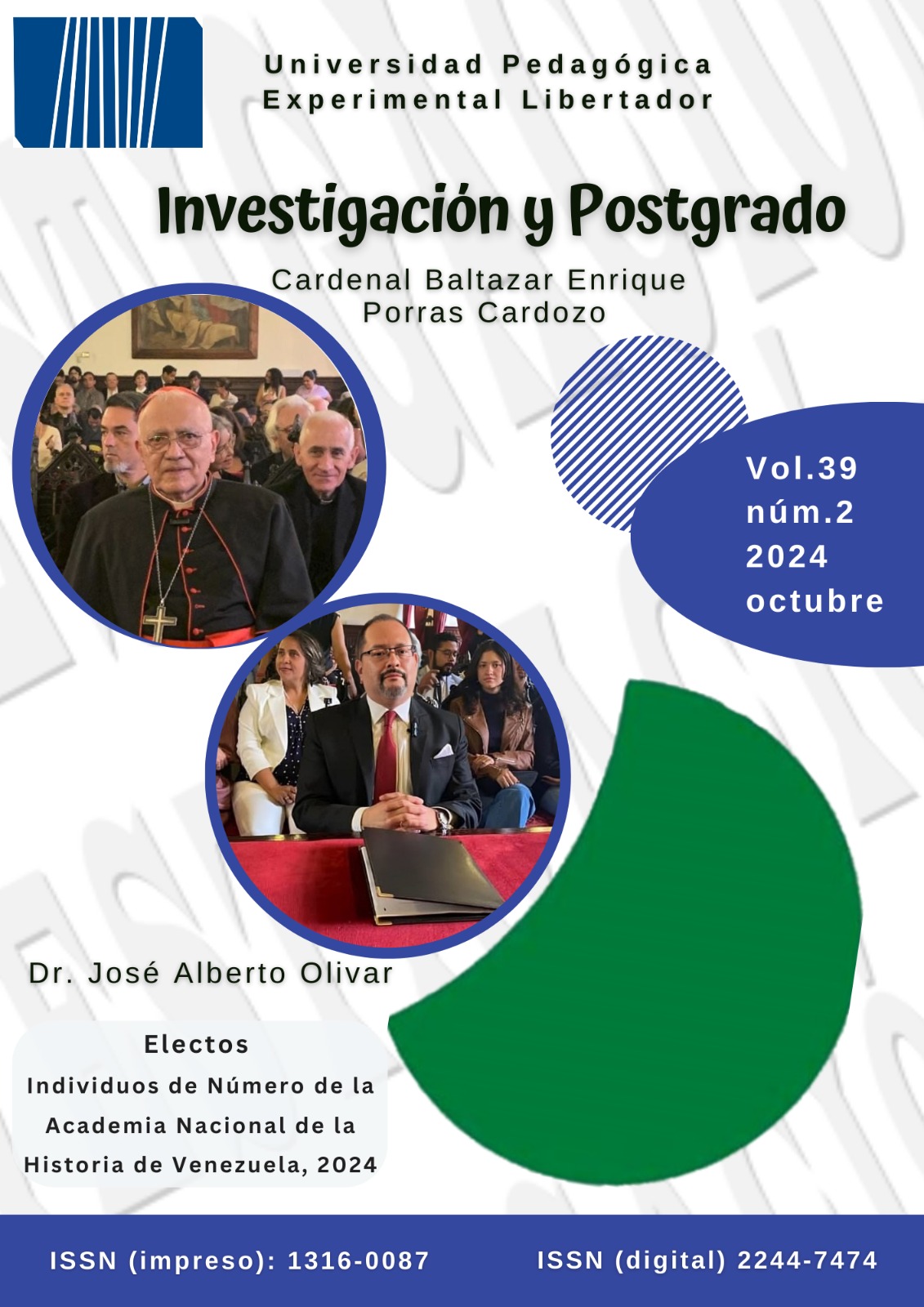ESTRATEGIAS PARA EL AUTOCONOCIMIENTO: UNA PRÁCTICA PEDAGÓGICA INNOVADORA PARA MINIMIZAR LA VIOLENCIA ESCOLAR
DOI:
https://doi.org/10.56219/investigacinypostgrado.v39i2.3328Palabras clave:
aprendizaje significativo, estrategias de enseñanza y aprendizaje, dinámica de grupos, violencia escolar, adolescencia, investigación-acción participativaResumen
Es conocido que la violencia escolar requiere un abordaje a mayor profundidad. Al respecto, esta investigación busca promover el aprendizaje significativo a través de estrategias de enseñanza y aprendizaje, apoyadas en dinámicas de grupo para minimizar la violencia escolar en estudiantes de tercer año de Educación Media General. De esta manera, se fue generando un clima de confianza entre los participantes mientras eran guiados en sus procesos cognitivos, metacognitivos y socio-afectivos para el conocimiento del desempeño personal propio y de sus pares, especialmente, el comportamiento violento y agresivo; asimismo, para el conocimiento del ambiente social. El paradigma es sociocrítico, la modalidad de campo y el método de investigación-acción participativa. El principal hallazgo radica en que los juicios de valor constituían la causa principal de los comportamientos violentos suscitados. No obstante, se logró la cohesión grupal y también se alcanzaron cambios apropiados en la conducta de la mayoría de los participantes.
Descargas
Citas
Alfonzo, A. (2003). Estrategia instruccional. www.medusa.unimet.edu.ve/educación /fbi21/estrategias.pdf
Ausubel, D. (1983). Teoría del aprendizaje significativo. http://delegacion233. bligoo.com.mx/media/users/20/1002571/files/240726/Aprendizaje_significativo.pdf
Cartwright, D. y Zander, A. (1971). Dinámica de grupos: Investigación y teoría. (3a ed.). Trillas.
Deutsch, M. y Krauss, R.M. (1970). La teoría del campo en Psicología Social. Paidós.
Díaz-Barriga, F. y Hernández, G. (2002). Estrategias docentes para un aprendizaje significativo: Una interpretación constructivista. (2a ed). McGraw Hill Interamericana.
Eljach, S. (2011). Violencia escolar en América Latina y el Caribe: superficie y fondo. PLAN y UNICEF. http://www.unicef.org/lac/violencia_escolar_OK.pdf
Fondo Internacional de Emergencia de las Naciones Unidas para la Infancia. UNICEF. (2014). Ocultos a plena luz: Un análisis de la violencia contra los niños. http://www.unicef.org/spanish/media/media_75530.html
Hansen, J.C., Warner, R.W. y Smith, E.M. (1981). Asesoramiento de grupos. El Manual Moderno.
Kowalski, R., Limber, S. y Agatston, P. (2008). Cyber Bullying. Bullying in the Digital Age. Desclée de Brouwer. http://es.slideshare.net/maricieloflores33/cyber-bullying-el-acoso-escolar-en-la-era-digital
Machado, J. y Guerra, J. (2010). Violencia en la escuela. Fundación Centro Gumilla. http://gumilla.org/violenciaescolar
Monereo, C., Pozo, J. y Castelló, M. (2001). La enseñanza de estrategias de aprendizaje en el contexto escolar. https://www.researchgate.net/profile/Carles_Monereo/publication/261082782_La_ensenanza_de_estrategias_de_aprendizaje_en_el_contexto_escolar/links/0a85e5332ba550896f000000/La-ensenanza-de-estrategias-de-aprendizaje-en-el-contexto-escolar.pdf
Organización de las Naciones Unidas para la Educación, la Ciencia y la Cultura. UNESCO. (2017). Why ending school-related Gender-based violence (srgbv) is Critical to sustainable Development (¿Por qué es crucial la eliminación de la violencia basada en género relacionada con la escuela para el desarrollo sostenible?]. http://www.ungei.org/resources/files/SDGsEnglish.pdf
Rodríguez, A. y Delgado, G. (2010). Estudio de expresiones de violencia escolar entre estudiantes de escuelas básicas venezolanas. Revista de Investigación, 34(70), 1-9 http://www.scielo.org.ve/scielo.php?script=sci_arttext&pid=S101029142010000200006
Rogers, C. (2000). El proceso de convertirse en persona: mi técnica terapéutica. Paidós. https://books.google.co.ve/books?isbn=844930993X
Rojas, B. (2014). Investigación cualitativa: Fundamentos y praxis. (3a. ed). Caracas: FEDUPEL.
Servicio de Atención Jurídica. (2023). Informe Somos Noticia. Cecodap. https://cecodap.org/informe-somos-noticia-2023-aumentan-las-solicitudes-por-acoso-escolar-abuso-sexual-y-maltrato/
Villamediana, C. (2017). Año 2016 somos noticia: Un panorama sobre las diferentes formas de violencia contra niños, niñas y adolescentes. Cecodap. http://www.cecodap.org.ve/descargables/derechosNNA/Informe_Somos_Noticia_2016.pdf
Publicado
Cómo citar
Número
Sección
Licencia
Derechos de autor 2024 Universidad Pedagógica Experimental Libertador

Esta obra está bajo una licencia internacional Creative Commons Atribución-NoComercial-CompartirIgual 4.0.
Investigación y Postgrado está bajo una licencia internacional Creative Commons Attribution-NonCommercial-ShareAlike 4.0 .
La política de acceso abierto y de licencias con “algunos derechos reservados” no niega la propiedad intelectual ni los derechos de los autores respecto a sus artículos, al contrario, los respeta. Es por ello que:
No se reservan los derechos de publicación de los artículos. Los autores podrán distribuir su artículo en cualquier otro medio, siempre y cuando sea sin fines de lucro. Debe informar al Editor de esta nueva publicación y debe dar el crédito a la revista Investigación y Postgrado.













